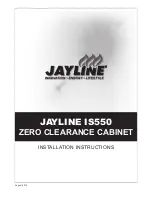
„Installation and operation manual for fireplace insert”
KFDECOENG1.1562012
11
Installation of outdoor air supply is mandatory. Regulations stipulate that at least 10 m
3
/h of
outdoor air must be supplied per 1 kW of furnace power. In case of the KFD ECO inserts, a
certain quantity of air can be supplied directly to the furnace. This requires installation of a
pipe with the diameter of 125 mm to the stub pipe situated in the bottom part of the fireplace
insert. The remaining quantity of air is to be supplied directly to the room in which the
fireplace insert is located.
NOTE: Exhaust ventilation devices working in the same room as the fireplace or in a room
with common ventilation may cause interference to proper operation of the fireplace.
Consequently, the ventilation installation design must allow independent operation of all
devices which consume air.
In case of another furnace in the same room, working simultaneously with the KFD ECO
insert, a sufficient quantity of air for combustion must be supplied, as required by each of the
installed furnaces.
All air inlets (grates) of intake ventilation leading into the room must be passable.
1.6 Installation of the fireplace enclosure
After trials confirming proper operation of the insert, further stages of fireplace construction
may proceed, involving construction of the enclosure at the sides, installation of the beam
and hood chamber. During installation, appropriate distance (5 cm) must always be
maintained between the insert walls and the surface of enclosure interior thermal insulation
(figure 14). The heat conductivity coefficient of mineral wool below 0,09 W/mK (measured at
the temperature of 200
°C) is required.
This is crucial as unrestricted air flow of a sufficient quantity in compliance with local
regulations is needed, ensuring required cooling the insert and important to further efficiency
of the whole air heating system (5 cm is to be measured between external ends of radiators
and insulation of the enclosure). Enclosure of the hood above the beam must also be
insulated properly up to the separating shelf (at least 30 cm below the ceiling
– also
insulated). A sufficient number of hot air outlet grates must be located immediately under the
shelf; outlet grate section must be appropriate to the given insert type (chapter 5). While
selecting the grates remember that many decorative motives, grills or lamellas reduce the
effective grate section area by up to 50%. During fireplace construction, consider
temperatures produced during combustion of wood. Parts of the fireplace insert body heat up
to 550
°C. Temperature at the convection air outlet grates must not exceed 90-100°C. In case
of failure or inappropriate use of the fireplace, the above temperatures may rise even higher.
Therefore, only appropriate materials with respective certifications may be used for
construction of the fireplace. The distance of combustible elements from the fireplace insert
must be 2 m, whereas the distance from outlet grates must be at least 0.6 m.
While installing the fireplace insert, remember to keep a gap of approximately 4 mm between
sides of the fire insert façade and parts of the enclosure (figure 16), required due to thermal
expansion of the material used for construction of the fireplace insert. A gap of approximately
8
mm between the top part of the fireplace insert façade and enclosure elements is also to be
kept.











































